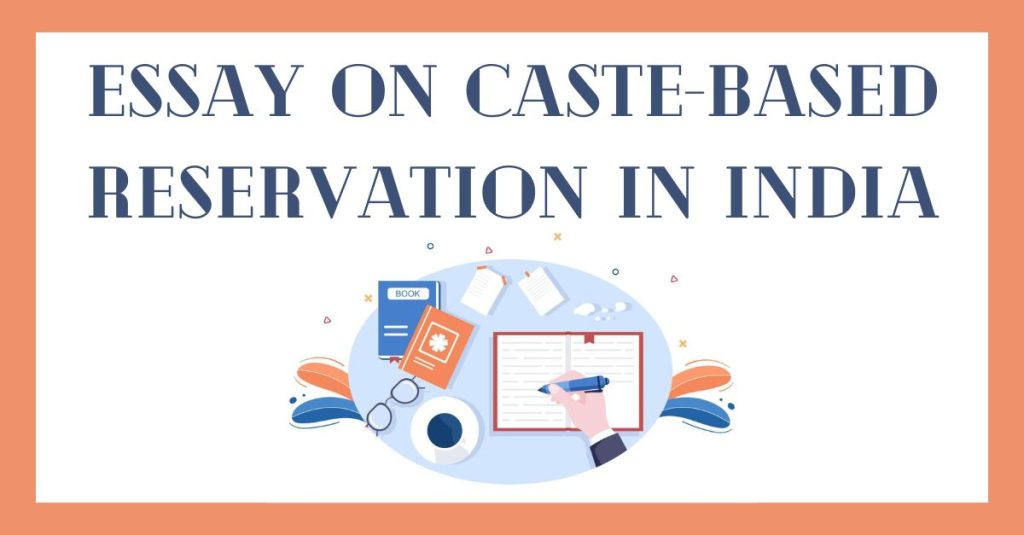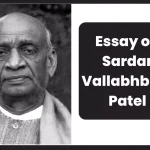Essay on Caste-Based Reservation In India: Caste-Based Reservation exists prominently in India. Students and Children are often asked to write an essay on the topic. This kind of topic is highly informative and opens up a lot of opportunities to be very liberal with the writing. It is up to the student if they wish to write the composition in a descriptive format or an argumentative one. Additionally, in case they choose to stand for or against the topic, we suggest they write with a very positive approach and not add anything that might be extremely offensive to any section of society.
Thus, the descriptive format of such essays is highly safer since it mainly focuses on describing the theme followed by fact-based general information deliverance on the same. Here we have provided samples for English essays on the topic, “Caste-Based Reservation In India” which are neutral in approach and highly informative. Read the following essays in order to derive ideas and inspiration.

Essay on Caste-Based Reservation In India
Subsequently, we have mentioned two essays that shall help in the formation and construction of your Essay on Caste-Based Reservation In India. The students can refer to them since they focus on providing information while keeping a balance between the positive and negative reception of the System of Reservation of Caste in India. Check the following essays, one for a word limit of 300 – 400 words, and the other for a limit of 600 – 700 words:
Short Essay Sample (300 – 400 Words)
In India, the constitution allows reservation to different categories on the basis of Caste, Gender, Economic Status or Creed. This is primarily due to the history of social classes and gender in the country. The present-day reservation system was formed in order to provide equity to the suppressed section of society. In order to make it easier for such people to eradicate backwardness from their lives, the Indian Constitution has a module to provide them with reservations during recruitment, schemes, and so on.
Reservation began in the pre-independence era when India happened to be under the colonial rule of the Britishers. Certain Quotas were introduced that evidently favoured certain castes or communities. British Raj introduced reservation in an elementary format in the Government of India Act of 1909. This ensured that the distinctive categories have a certain social standing and the discrimination is lowered to an extent in a male Hindu Bhramin-dominated society. Further, in 1932, various communities comprising religious and social minorities were provided with a separate electorate system. This was supported by Backward Classes leaders such as Dr Bhimrao Ambedkar. However, Mahatma Gandhi opposed it. Sooner, the two sections reached common grounds where the reservation was provided within the system and not separately.
Post Independence, Scheduled Castes and Scheduled Tribes were able to gain reservations followed by the addition of the Other Backwards Classes in 1980. Finally, in 2019, Economically Weaker Sections were also added to reservation criteria to ensure that they also have equal chances and rights in the nation. Reservations help the categories to get help with recruitment, education, welfare schemes, and other social initiatives of the Government. The categories also form society and their standing is recognised by providing relaxation while considering the problems and discrimination they face due to their Caste, Gender, Economic Status or Creed in daily life.
This has positively resulted in the betterment of the backward and discriminated people and given them a holding in society that differs from them on the basis of factors such as Caste, Gender, Economics or Creed. In a negative scenario, the unreserved classes might end up feeling neglected and there could be considerate suffering for their hard work or opportunities that they lose to reserved categories with lower qualifications. The authorities are constantly questioned on a daily basis regarding the reservation system and this often created a negative impact. However, a balanced reservation scheme along with a non-discriminative and considerate society can only solve the issues together.
Long Essay On Caste-Based Reservation
Discrimination and unfair treatment of socially weaker sections are very common phenomena across the globe. Be it Caste, Creed, Gender, Colour, Religion, or Sexuality, humans distinguish each other. This leads to the suffering of the ones who are discriminated against. Further, the consequences have been observed as the collective backwardness of the people as a community. This disturbs the social balance further resulting in grave oppression of human rights by the classes that tend to oppress. To avoid all this, Reservation is a measure. The system of reservation of seats in educational institutions, job vacancies, providing waivers in monetary charges, prioritisation in welfare initiatives, and much more are prevalent in many sections of the world. Even in India, Caste-Based discrimination has an extensive history along with the consequential reservation of certain groups.
The distinction of humans on the basis of castes holds a very dominant page in the history of the Indian subcontinent. There were mainly 4 Varnas or Categories that were considered in order to categorise the Indians. These were namely, Bhramin (Highest), Kshatriya (Higher), Vaishya (Lower), and Shudra (Lowest). Those who were considered to be extremely lowest and unworthy of categorisation formed the Dalit Community in all religions. This was the basic Indian Structure of Caste-Based Discrimination. This carried on for millennials and finally, the suppression eventually degraded to extremely devious situations. With awakening and independence movements, the lower castes developed a righteous ambition to end the oppression against them as a community.
The Britishers did provide reservation benefits to certain communities in the colonies. However, the system was enough concrete and considerate. Independent leaders of provinces did try on their parts for the upliftment of the backwards but they were beneficial only to a limited extent. It was finally observed post-independence in 1947 that the Constitution provided tactile reservation benefits to Scheduled Castes SCs and Scheduled Tribes STs. Even the Parliaments hold a proper representation of people on the basis of the communities they belong to.
Further, in 1980, Other Backward Classes were allowed reservations, helping them with their social composition and balance in society with equal rights. It was eventually in 2019, that the Economically Weaker section was acknowledged for the Reservation System and started being provided with relaxations in various social initiatives and events.
Reservation enables a reduced cut-off for admissions to educational institutions. Additionally, fee waivers, discounts, and easy procedures are ensured for the reserved categories. In State and Central Government jobs and recruitments, the categories have certain seats reserved for them. This assuredly creates a balance in professional workspaces. The educational requirement is relaxed and the recruitment process is made easier. Further, in welfare initiatives, minorities are preferred and prioritised. This enables them to get an opportunity in being treated with equity in society and an equal chance in the future.
Nevertheless, the system of reservations does have certain loopholes and practically non-beneficial consequences. The reservation system is actively opposed by the unreserved categories who lose out on golden opportunities by a minor difference due to the prioritisation of the lesser qualified and deserving candidates of reserved categories. Additionally, the Economically Weaker Sections do not get much higher relaxations as compared to the reserved castes. This creates an economically imbalanced society and the EWS is unable to monetarily uplift itself.
Every concept, aspect, idea, or system has positives and negatives attached to it. At the end of the day, what matters the most is that the number of beneficiaries is higher than the ones who are facing unsolicited negative consequences and are not harmed in the process. Thus, the system can be implied with a more balanced perspective without considering political benefits and society also becomes more accepting and socially comfortable for the depressed castes and classes.
Put down more thoughts on “Essay on Caste-Based Reservation In India” in the comment section below by sharing ideas and point ts to make this space better!






